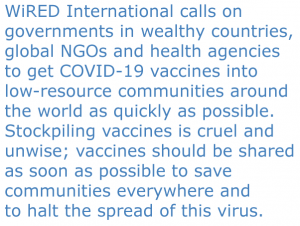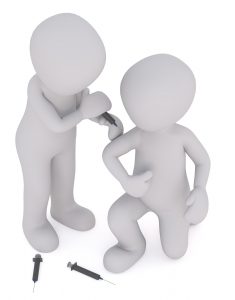COVID-19 Vaccinations Begin as Questions about Them Rise
What You Need to Know
By: Allison Kozicharow; Edited by Jessie Crowdy
As the COVID-19 vaccine distribution rolls out in countries around the world, many of us have questions. Is it safe? Should I get it at all?
 The global race to develop an effective COVID-19 vaccine has been swift and fierce — arguably the most massive effort humans have ever mounted against a disease. Now that vaccines exist and have passed through clinical trials for safety and effectiveness, the majority of people have to get vaccinated for the world to be rid of this deadly disease. As long as the virus lives in the human population, it will continue as a threat.
The global race to develop an effective COVID-19 vaccine has been swift and fierce — arguably the most massive effort humans have ever mounted against a disease. Now that vaccines exist and have passed through clinical trials for safety and effectiveness, the majority of people have to get vaccinated for the world to be rid of this deadly disease. As long as the virus lives in the human population, it will continue as a threat.
WiRED International calls on governments in wealthy countries, global NGOs and health agencies to get COVID-19 vaccines into low-resource communities around the world as quickly as possible. Stockpiling vaccines is cruel and unwise; vaccines should be shared as soon as possible to save communities everywhere and to halt the spread of this virus.
People around the world get vaccines throughout their lives from birth on up, including a yearly shot against the flu. Vaccines protect us, our loved ones and our communities from deadly and debilitating illnesses such as polio, chickenpox and measles. Vaccines have been around in one form or another for more than two hundred years.
 Vaccines help our bodies develop immunity to the virus that causes an infectious disease without our having to get the illness. It works by stimulating the immune system’s production of antibodies, the proteins that help to protect people from a future infection if they ever come across the real germ.
Vaccines help our bodies develop immunity to the virus that causes an infectious disease without our having to get the illness. It works by stimulating the immune system’s production of antibodies, the proteins that help to protect people from a future infection if they ever come across the real germ.
Vaccines are a true scientific success story. However, the COVID-19 vaccine like any other will only be effective when a large portion of the population takes it AND when it becomes available to populations who live in the world’s poorest communities. WiRED urges everyone to get the vaccine when it becomes available. In the meantime we must continue to wear a mask, social distance and wash our hands frequently.
Answers to Your COVID-19 Vaccine Questions
How does the COVID-19 vaccine work?
All but one of the vaccines that are currently in or have completed final clinical trials in the United States need two shots — spaced a few weeks apart — to be effective.
How much does it cost?
Most countries will provide the vaccine free to their citizens. In the United States the vaccine is free, but if vaccine providers charge an administration fee for giving the shot, this fee should be covered by public or private insurance, or by a government relief fund for the uninsured.
How effective is the vaccine?
Both the Pfizer and Moderna vaccines have proved to offer more than 94% efficacy.
Why should I get it?
The vaccine will keep you from getting COVID-19 — and consequently prevent anyone from getting the disease from you. Vaccines protect everyone.
Who should take the vaccine?
Most everyone. Exceptions include people with known severe allergic reactions to vaccines. Note that because pregnant women did not participate in the clinical trials, they should discuss taking the vaccine with their healthcare provider.
How do I know it’s safe?
The vaccines should be safe for everyone — even the frailest elderly people. Some participants in both the Pfizer and Moderna trials experienced mild side effects after vaccination including injection site pain, fever, chills, headaches, muscle aches and joint pain. These symptoms are temporary and are in line with side effects some people experience from other vaccines, including the flu shot and the vaccine to prevent shingles.
Who gets the vaccine first?
- Healthcare personnel in hospitals, long-term care facilities, outpatient care facilities, emergency services
- Persons working in food and agriculture, transportation, education and law enforcement
- People with high-risk medical conditions and adults aged 65 years or older
Can I stop wearing a mask and social distancing once I receive the vaccine?
No. It typically takes several weeks for the body to build immunity after vaccination. Even after that, continuing to take these precautions is the best protection for you and others.
If I have had COVID-19, do I need the vaccine?
The verdict is still out when it comes to how long you are protected from COVID-19 after a previous infection — what’s referred to as natural immunity. In fact, early evidence suggests natural immunity from COVID-19 may not last very long. Remember you need to get a flu shot every year.
What happens if I just ignore the shot?
You are not only putting yourself at risk but you are failing to protect your family, friends and anyone who comes in contact with you.
Sources for this Q&A and further information: Centers for Disease Control and Prevention, New York Times, Mayo Clinic, AARP and Consumers Reports


